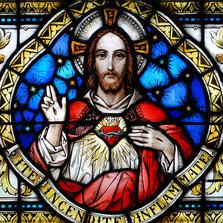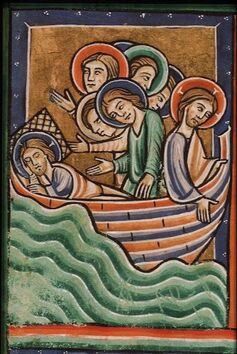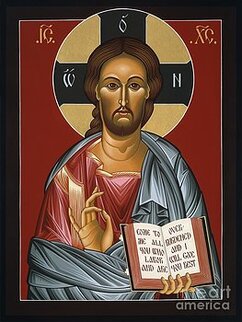 God's limitless care and mercy God's limitless care and mercy Sometimes it takes a challenge to recognize an area in need of growth. Recently I was working on something in which a last minute glitch took place, creating a substantial bit of stress. I prayed for a resolution, but after a few hours of still feeling anxious about it, I realized my trust in God wasn’t what it should have been: although I asked the Lord for help, it was as if I did not really believe He would. I thought I trusted God, but my worrying and ‘stressed-out’ spirit was a red-flag indicating that my trust was coming up short. In truth, it is easy to trust in God when everything is going smoothly, but even with the best of intentions, when things get tough trusting is far more of a challenge. It is often difficult to trust in the midst of that which is out of our control, but unlike the apostles on the Sea of Galilee, we must be aware that the Lord is riding out the storm with us. Therefore, it is important to examine whether we believe that God truly remains present no matter the outcome. And if the outcome does involve greater challenge, we need to understand that though difficult, suffering might be the path on which He accompanies us, our way to holiness. It is important to our life of faith that we be attentive to our level of trust so that in times of trouble we can better rely on God’s limitless care and mercy. The good news is that no matter how we might feel in a given moment, the Sacred Heart of Jesus is always open to us.  do you not yet have faith? do you not yet have faith? All three synoptic gospels recount the story of Jesus calming a storm at sea.* While Jesus and the apostles were crossing the Sea of Galilee a fierce storm blew up. The apostles panicked while Jesus slept, so they awakened Him saying, “Do you not care that we are perishing?” Jesus rebuked the storm, and then asked them, “Do you not yet have faith?” This demonstrates how easy it is to lose trust and faith in the Lord when chaos ensues. A second storm at sea is recorded in the Gospels of Matthew, Mark, and John, only this time the terrified apostles see Jesus walk across the water and approach the boat, identifying Himself as “I Am,” something totally lost on them. (Mark 6:50)** Only Peter had a moment of courageous trust, (or impulsiveness); he got out of the boat, walking on the water until his faith wavered as if he suddenly remembered that walking on water is ‘impossible.’ Thus, Peter sank and Jesus (lovingly) challenged him: “O you of little faith, why did you doubt?” (Matthew 14:31)  with Him, we can withstand all things with Him, we can withstand all things It is important to consider whether we are like those apostles, thinking we will perish when we get ‘storm-tossed.’ Jesus said that if we told a mountain to throw itself into the sea “it would be done.” He continued: “All that you ask for in prayer, believe that you will receive it and it shall be yours.”(Mark 11: 23-25) Do we really believe these promises? Surely Jesus would not say something like this if He did not mean it; speaking any untruth is impossible for Him since He is the Truth. (John 14:6) While Jesus used some hyperbole,*** He certainly meant that if we have belief and trust, He will follow through. Of course, God is not like the proverbial genie in a bottle who grants wishes, but rather, when something is needed to give strength, aid growth in faith, help a loved one be healed, or build the Kingdom, we should pray with trust that God will do it. In prayer, if we offer Him our fear as the only gift we can give at that moment, He will fill the space created by our gift with the peace only He can give. But if we do not truly give Him the fear, there is no room for the peace. Jesus has command over chaos and whatever storms rock our world. Therefore, we can hand God all our troubles, cares, difficulties, and challenges, trusting that with Him, we can withstand all things; His is the victory, and so together we will prevail.  His mercy is endless His mercy is endless Jesus did not promise a trouble-free life, but through His mercy we have been left with many spiritual resources offered through the Holy Spirit. We meet Him in the Sacraments and in prayer: the best way to cultivate trust and faith, and to develop our relationship with Jesus, is through these. If we do not speak with Him or develop our friendship with Him, it will be difficult to turn to Him or to trust in what He promises. Prayerful reflection on the Gospels reveals the heart of Jesus; to see how God’s power works, look to the early Church as described in the Acts of the Apostles; to see what grace can do, look to the lives of the Saints who trusted God so completely that they gave their all for Him. Adoration and worship, private prayer and study are all pathways to deeper trust, lively faith, and holiness. No one is perfect, and none of us will ever be perfect in our trust, but we can work at it with the help of grace. In this month of celebrating the Sacred Heart of Jesus, let us trust that His heart is wide, His mercy endless, and that there is much room in it for everything we bring.  may we ask for the graces of courage and trust may we ask for the graces of courage and trust May we join our hearts to the Sacred Heart of Jesus! May we ask the Holy Spirit for the graces of courage and trust, especially when we are most challenged! May we bear witness to the trust that comes from intimacy with God through prayer! And may we be like the apostles and holy ones who learned to put all their trust in God! Let us meet in the Sacred Heart of Jesus! ©Michele L. Catanese * Mark, Matthew, and Luke are the synoptic gospels. This designation refers to the fact that they share a common outline, as written (first) by Mark. While they do contain some of the same stories, there is also much that is unique to each gospel. ** It is notable that Luke omits this story, but John includes it. John only repeats two miracles that appear in the other gospels and that is the feeding of 5000 and Jesus walking on water. The three who wrote of the walking on water emphasize that Jesus is I AM, that is, God, when they report Jesus saying, “It is I. Do not be afraid.” But the apostles were so frightened that they failed to catch the reference. Here are the passages if you wish to compare the stories: Calming of the Sea: Matthew 8:23-27, Mark 4:35-41, Luke 8:22-25 Walking on Water: Matthew 14:22-33, Mark 6:45-52, John 6:16-21 *** Hyperbole is a Jewish teaching tool that was customarily used to make a point that was not to be missed. It is a not-so-subtle exaggeration. Images: 1. My photo; stained glass, Sacred Heart of Jesus. 2. Painting, Jesus Calming the Storm from Pictorial Bible of Abbey of St. Bertin French (St. Omer), 1190-1200, The Hague, Koninklijk Bibliotheek 3. Painting, Approaching Storm, Dog Point, Summer 2014, by Tom Thompson 4. Icon, Christ All Merciful, by Fr. William Hart McNichols. You can find this icon at fineartamerica.com/featured/christ-all-merciful-022-william-hart-mcnichols.html 5. Painting, Evening 1907, by Childe Hassam Note: In compliance with GDPR rules, I wish to make it clear that I do not gather any information on any of my readers at any time. Comments are closed.
|
Heart Speaks to Heart
|

 RSS Feed
RSS Feed

